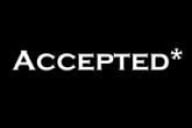You have /5 articles left.
Sign up for a free account or log in.

Wikimedia Commons
The pendulum swings quite a bit on the issue of asking applicants to colleges about their disciplinary records and criminal backgrounds. A decade ago, the Common Application added such questions at a time when many colleges were being criticized (and, in some cases, sued) for admitting students whose past records might suggest that they pose a danger to other students.
But in the last few years, groups that advocate for criminal justice reform and those that have noted patterns of police and school discrimination against young minority males have asked whether such questions inevitably lead to the rejection of many of those who check the boxes -- perhaps unfairly. And others have raised questions about whether admissions officers are trained to analyze such information in ways that distinguish someone who made a few mistakes as a freshman or was the victim of discrimination as compared to someone who really may pose a threat.
Admissions officers (as evidenced in a survey by Inside Higher Ed) appear divided on these issues.
On Wednesday, New York University posed a series of questions to the Common Application that may take the discussion in a new direction.
MJ Knoll-Finn, NYU's vice president for enrollment management, sent a letter to the Common Application asking, in essence, if it could demonstrate any value in asking the questions it asks.
"Ensuring the safety of the campus community and the personal integrity of students are important goals for universities. On its face, the rationale for the presence of the questions seems obvious: to enable a university to make an admissions decision that takes account of all relevant information concerning an applicant’s history," Knoll-Finn wrote.
But she added, "Especially in the context of high rates of school discipline and incarceration among people of color, it seems vital to pose two questions about the checkboxes: Do they, in fact, have any predictive value, and does their presence work against universities’ mission as engines of social mobility and diversity either by discouraging applicants or by resulting in unjustified denials of admissions on the grounds of safety or integrity?"
The two questions the Common Application includes are: "Have you ever been found responsible for a disciplinary violation at any educational institution you have attended from the ninth grade (or the international equivalent) forward, whether related to academic misconduct or behavioral misconduct, that resulted in a disciplinary action?" and "Have you ever been adjudicated guilty or convicted of a misdemeanor, felony or other crime?"
Knoll-Finn wrote that colleges and universities that consider those questions "confront a challenge: a lack of clear, objective evidence."
As NYU is pressuring the Common Application, The New York Times reported that Lawyers’ Committee for Civil Rights Under Law is looking at 17 colleges that ask even broader questions (that include whether someone has ever been charged with crimes, not just convicted) and whether such questions and follow-up by admissions officials may constitute discrimination.
NYU, acting at the request of student groups on campus, changed its policy on the questions this year (although not as far as some would like). For the first time, in the admissions cycle this academic year NYU admissions officers are doing a first review of applications without knowledge of whether someone has checked the criminal conviction box. Then after that first cut, the university is using the material.
Typically, NYU receives 50 to 80 applications with the box checked, and the freshman class tends to have five to 10 students who checked it.
The Common Application did not respond to a request for comment on whether it has any research on the validity and value of having the boxes on the application. NYU's letter volunteered to share its information and work with other colleges and universities to study the topic.
A spokesperson for the Coalition for Access, Affordability and Success, a group of elite colleges planning an alternative to the Common Application, said via email that it was too early to say whether that group would include questions on disciplinary or critical records. But the spokesperson added that "the coalition welcomes all input and will take this topic into consideration."








